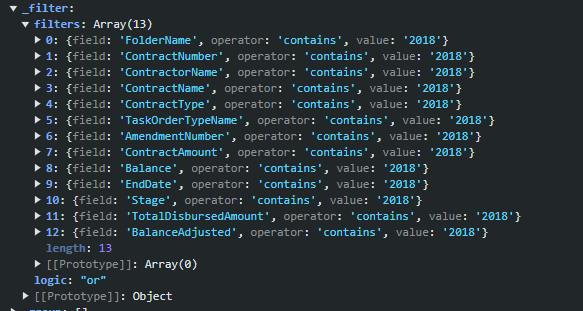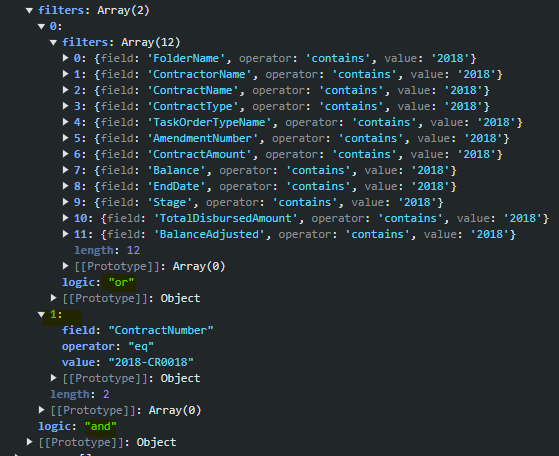Bug report
In a .NET 7 project when TagHelper Grid is configured and RuntimeCompilation is employed, starting from version 2023.2.606 an unhandled exception is thrown.

Reproduction of the problem
- Create a .NET 7 project
- Enable RuntimeCompilation
- Install a 2023.3.606 or later version of Telerik UI for ASP.NET Core
- Configure a TagHelper Grid
Current behavior
When run a runtime error occurs
Expected/desired behavior
TagHelper Grid should exhibit the same behavior as HtmlHelper ones.
Environment
- Kendo UI version: 2024.1.130
- Browser: [all]
Is it possible to implement template options for the "update" and "cancel" column commands of the Grid?
For example:
$("#grid").kendoGrid({
columns: [{
command: [{
name: "edit",
template: {
update: "<button class='customUpdate'>Save</button>",
cancel: "<button class='customCancel'>Cancel</button>",
}
}]
}],
...
});
Currently, when using the default Grid search functionality and the column filter menus, we observe the following:
- When a column filter is applied first, using the Search feature afterward overrides the column filters, applying the search filter with the "contains" operator to the specified columns.
- Conversely, when a search is performed first and then followed by a column filter, the grid generally functions as expected.
However, there’s a specific scenario where this does not work properly:
- If a search is performed and then a column filter is applied to a column where the search criteria are relevant, the Grid returns no data.
For example:
- After searching for "2018," the expected columns displayed in the filters (notably, the ContractNumber is among them).
- When a column filter is subsequently applied to ContractNumber (e.g., setting it to "2018-CR0018"), the Grid removes the ContractNumber from the search filters and adds the column filter with an "AND" operator. This setup returns no data because of the search filters and the "AND" operator.
Expected Behavior and Alternative
This functionality behaves correctly in the Telerik UI for Blazor Grid component - the search and column filters are managed as separate objects.
Is it possible to enhance the Grid filtering similar to the Blazor Grid?
I'd like DateOnly support to be introduced to Telerik UI for ASP.NET Core because my Grid uses that type and issues occur in the Grid's PopUp and InLine editing fields that are bound to DateOnly fields.
Hi, is there a way to configure the grid so that when it's grouped and later sorted, the grouping state (expanded/collapsed) is preserved?
Kind Regards
Erwin
It would be convenient to have built-in MultiColumnComboBox editing for the Grid.
I was hoping the component would show the addresses formatted in columns (as per a fields list) and then return the address concatenated into a single to the grid field (e.g. from .DataTextField("FullAddress")).
Bug report
Grid Hidden Column is set as exportable by default for Pdf and Excel
Reproduction of the problem
- Set a Column as hidden through the Hidden() API configuration.
- Add both the ToolBar.Excel() and ToolBar.Pdf() API configurations.
- Notice, that the hidden column is exported.
Current behavior
The Grid Hidden Column should be set as exportable by default for Pdf and Excel.
Expected/desired behavior
The Grid Hidden Column should not be set as exportable by default for Pdf and Excel.
Environment
- Kendo UI version: 2024.3.806
- Browser: [all]
Bug report
When the Grid is nested in a relatively positioned container, during the export the Grid gets an overflow style to its wrapping element. Then the style is removed and re-added again. This happens in a loop, which results in a vertical scrollbar constantly appearing and hiding.
Reproduction of the problem
- Open this dojo example: https://dojo.telerik.com/IZoxOvOG/7
- Click the "Export to PDF" button in the Grid's toolbar
Current behavior
Flickering caused by a scrollbar appearing and hiding
Expected/desired behavior
The Grid should remain unchanged during the export and no scrollbar should appear and hide during the export.
Environment
- Kendo UI version: 2024.3.806
- jQuery version: x.y
- Browser: [all ]
When creating columns in a TagHelper Grid definition, the Width property allows only numbers:
<column field="OrderID" width="100">
</column>This does not match the width property in the Kendo UI and HtmlHelpers Grid definitions which allow string values to be entered as well:
https://docs.telerik.com/kendo-ui/api/javascript/ui/grid/configuration/columns.width
That way, the developer will be able to add rem and other unit values in TagHelper syntax as well.
Also, it would be convenient if there is a new property similar to this:
<column field="OrderID" tooltip="Unique Number of the Order">
</column> <column field="Freight"
html-attributes='new Dictionary<string, object>{ ["style"] = "width: 30rem;" }'>
</column>
### Bug report
When the Grid is grouped by a specified column, and this column has a "groupFooterTemplate" that contains aggregates from other fields, it cannot be exported to Excel. It throws a JavaScript exception.
### Reproduction of the problem
1) Group the Grid by the column "ProductName".
2) Export it to Excel through the built-in command "Export to Excel".
3) JS exception is thrown.
A Dojo sample for reproduction: https://dojo.telerik.com/UyUruyOZ
### Expected/desired behavior
The Excel export should work as expected when the Grid is grouped.
### Environment
* **Kendo UI version: 2022.2.802
* **jQuery version: 1.12.4
* **Browser: [all]
Overview
At this stage, the ToolBar.Custom() API configuration does not expose built-in configurations for adding a handler and partial view. E.g:
@(Html.Kendo().Grid <TelerikAspNetCoreApp455.Models.OrderViewModel>()
.Name("grid")
.ToolBar(toolbar => {
toolbar.Custom().Name("Test1").ClientTemplateHandler("someHandler");
toolbar.Custom().Name("Test2").ClientTemplateView(Html.Partial("_Test2"))
})
...
)Current behavior
The ToolBar.Custom() API configuration does not expose built-in configurations for adding a handler and partial view.
Expected/desired behavior
The ToolBar.Custom() API configuration should expose built-in configurations for adding a handler and partial view.
Environment
- Kendo UI version: 2024.3.806
- Browser: [all]

When it is not scrollable it will look like this and not correct aligned.
When I have enough items it i will look good but since my database is dynamic I cannot wait till it is full.
What should I do?
.Scrollable() --> this it the option which I use.
### Bug report
When subscribing to the "requestStart"/"requestEnd" events of the DataSource after the Grid's initialization, the events do not fire during the Excel export.
### Reproduction of the problem
1. Enable the server operations of the Grid's DataSource.
2. Get a reference to the Grid and handle the DataSource "requestStart"/"requestEnd" events by using the bind() method.
3. Export the Grid's data to Excel through the built-in command.
4. The "requestStart"/"requestEnd" events do not trigger when the read request is activated.
A Dojo sample for reproduction: https://dojo.telerik.com/eyiDIGeM
### Expected/desired behavior
The "requestStart"/"requestEnd" events must trigger when exporting the Grid to Excel.
### Environment
* **Kendo UI version: 2024.3.806
* **jQuery version: 3.7.0
* **Browser: all
Bug report
Reproducible with the Grid's tag helper. Works as expected in the Html helper.
Reproduction of the problem
- Run this example: https://netcorerepl.telerik.com/QSuBQmlo123kvYQt54
Current behavior
The toolbar does not show the RadioGroup.
Expected/desired behavior
A RadioGroup should appear in the toolbar, as set in the toolbar command template:
<toolbar-command-template>
<kendo-radiogroup name="test">
<kendo-radiogroup-items>
<kendo-radiogroup-item label="Factor" value="F"></kendo-radiogroup-item>
<kendo-radiogroup-item label="Equation" value="E"></kendo-radiogroup-item>
</kendo-radiogroup-items>
</kendo-radiogroup>
</toolbar-command-template>
Environment
- Kendo UI version: 2024.2.514
- jQuery version: x.y
- Browser: [all ]
Bug report
Setting the Reoderable.Rows.ClickMoveClick() API configuration explicitly to false results in an error when using the HTML Helper wrappers.
Reproduction of the problem
- Open the following Telerik REPL.
- Set the Reoderable.Rows.ClickMoveClick() to false.
- Notice the thrown client-side error.
Current behavior
Setting the Reoderable.Rows.ClickMoveClick() explicitly to false throws the following error:
Expected/desired behavior
Setting the Reoderable.Rows.ClickMoveClick() explicitly to false should not throw an error.
Environment
- Kendo UI version: 2024.2.514
- Browser: [all]
### Bug report
The "confirmation" attribute of the editable tag does not accept a string.
### Reproduction of the problem
Add a confirmation text as a string in the "confirmation" attribute, as per the example below:
<kendo-grid name="grid">
...
<editable mode="popup" confirmation="Are you sure you want to hide this invoice?" />
</kendo-grid>
A REPL sample for reproduction: https://netcorerepl.telerik.com/moEqPSFo32PrwW4d01
### Expected/desired behavior
The "confirmation" option must accept a string.
### Environment
* **Telerik UI for ASP.NET Core version: 2024.2.514
* **Browser: [all]
### Bug report
The Column.Exportable option is not correctly serialized and cannot be used to export hidden columns.
### Reproduction of the problem
1. Set Column.Exportable(true) and Column.Hidden(true).
2. Export the grid and see that the column is not present in the exported file.
### TicketID:
1543405
### Environment
* **Kendo UI version:** 2021.3.1109
* **jQuery version:** 1.12.4
* **Browser:** [all]
Currently, this can be achieved with custom javascript:
https://docs.telerik.com/kendo-ui/knowledge-base/filter-by-date
Bug report
When tabbing in a batch editable Grid cells do not enter edit mode.
This is a regression introduced with v 2023.2.606.
Reproduction of the problem
- Run this dojo
- Click on a cell in Product Name column - an editor is generated
- Press the Tab key
Current behavior
The corresponding Unit Price is focused, but an editor is not generated
Expected/desired behavior
The cell should enter edit mode, as with v2023.1.425 - dojo
Environment
- Kendo UI version: 2023.2.606
- Browser: [all]
I'm using the grid with a Status Bar Template and a button component in the template.
When trying to reference the button using the data() method it returns "undefined".
I've made small changed to the Grid's "selection Aggregates" demo to show the problem:
In the sample code, when selecting a cell in the top grid, the "T" button should be enabled but the line
returns undefined.



